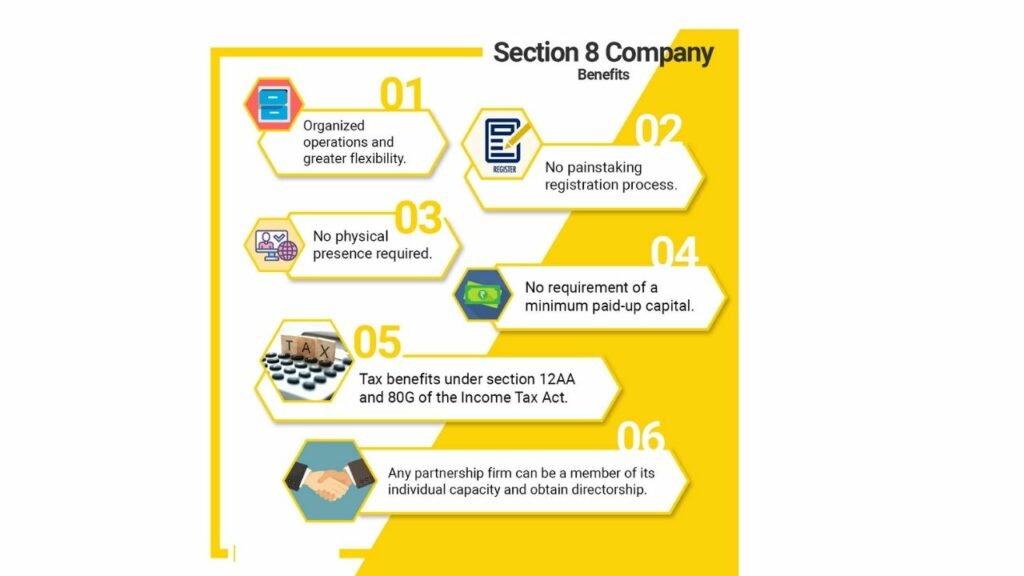Companies in Section 8
When someone hears the name of a firm, the first thing that springs to mind is its name. The importance of a good name rises in the case of a non-profitable organisation (NGO) or a charitable organisation established under Section 8 of the Company Act, 2013.
The main purpose of these Section 8 companies is to advance commerce, the arts, sciences, sports, education, research, social welfare, religion, charitable giving, environmental protection, or any other objective designed to benefit a particular group within society or the whole population.

Section 8 Companies
Therefore, in order to draw more volunteers who will work for the organisations and aid them in more swiftly achieving their goals, these institutions or businesses must focus on bringing the company to light and leaving a lasting impact on the public.
An Association, Foundation, Society, Council, Club, Charities, Institute, Academy, Organization, etc. may be named and registered as a Section 8 company with the Ministry of Corporate Affairs of the Government of India.
Since these businesses are legally registered and recognized by the Company Act 2013, the method for registration and name requirements are set within the procedure to register a company as per the rules of the Act.

Registration of Section 8 Company
A Section 8 company differs from a trust or a society solely in terms of registration, since the former is registered under the Ministry of Corporate Affairs of the Government of India, whilst the latter is registered under the legislation of the State Government. In comparison to a trust or a society, a Section 8 corporation has stronger legal standing, recognition among stakeholders and funders, and a high reputation.
The technique, however, stays the same. The relevant papers, such as PAN (Permanent Account Number), address proofs, passport size pictures, and so on, of all the directors and promoters, must be gathered and placed in the proper sequence in order to establish a Section 8 business. The DSC (Digital Signature Certificate) and DIN (Directors Identification Number) of all the company’s promoters and directors must then be obtained.
The most crucial step now is to name the firm suitably, so that it reflects the organization’s mission. Because a company’s name is what distinguishes it from the competition, it must be distinct in order to avoid copyright difficulties and be clearly associated with the company’s mission.
Approval of Name
It is necessary to register and approve the company’s name legally. This helps to prevent any copyright difficulties and ensures that no other section 8 companies have been registered under the same name. An application form INC-1 should be submitted to the company’s Registrar (Central Registration Centre – CRC of Ministry of Corporate Affairs) to get approval. To eliminate the possibility of name duplication, the applicant must submit six distinct names for approval. The name’s validity might last up to 60 days after it has been granted. To be regarded as a legitimate section 8 business name, the recommended names must include terms like foundation, association, forum, council, chambers, and so on, according to the Company (Incorporation) Rules, 2014.
Licensing the company
Once a company’s name has been authorised, it is required to get a licence. An application form INC 12 must be submitted together with the appropriate documentation, as well as the authorised payments. The licence may be cancelled by the Central Government at any time under the terms of Rule 8(6) of the Companies (Incorporation) Act, 2014, in the event of any violation of the section’s requirements or breaches of any restrictions against the public interest, among other things.
Conclusion
A section 8 company contributes to society’s advancement while receiving protection from several regulations and tax obligations. This gives these companies a competitive advantage over rival companies. As a result, it is essential that these companies establish themselves legally and follow the rules in order for society to gain.



